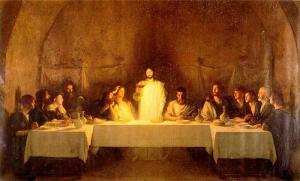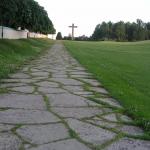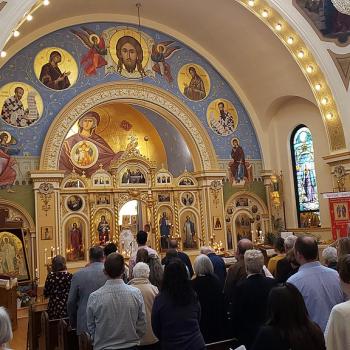 The needs of the body and the needs of the soul are inter-related. Our body and soul are interdependent entities which connect with and affect each other. No body has life without a soul, for the soul is itself the life-force which animates the body. But because its nature is not only to animate the body, but to direct it and guide it through spiritual principles, when the soul no longer animates the body in death, it loses much of its own meaning and value; it continues on, but imperfectly in a state of being which can be said to be that of a spiritual death. To be concerned about the soul, the body must also be considered, for the soul is properly itself only in and with the body, which is why the resurrection is a good, for it restores the unity between body and soul, but the state of that resurrected form will depend upon the state of both the body and the soul at the time of the resurrection.
The needs of the body and the needs of the soul are inter-related. Our body and soul are interdependent entities which connect with and affect each other. No body has life without a soul, for the soul is itself the life-force which animates the body. But because its nature is not only to animate the body, but to direct it and guide it through spiritual principles, when the soul no longer animates the body in death, it loses much of its own meaning and value; it continues on, but imperfectly in a state of being which can be said to be that of a spiritual death. To be concerned about the soul, the body must also be considered, for the soul is properly itself only in and with the body, which is why the resurrection is a good, for it restores the unity between body and soul, but the state of that resurrected form will depend upon the state of both the body and the soul at the time of the resurrection.
The implication of this is that to be spiritual, the body must also be accepted and its good promoted. The needs of the body need to be considered and engaged. To reach someone, to help them spiritually, their physical presence must not be neglected. Jesus fed the hungry, healed the sick and wounded, indeed, he gave himself to the world to be its food and drink so that he can rise in his followers and continue to work in and through them for the salvation of the world. Jesus did not come into the world merely to be a preacher, teaching dogmatic truths of a spiritual nature that had no connection to the world at large. Rather, he came to help the world, to heal it from all its physical and spiritual wounds. He went to people where they were at, seeing what they needed from him, and he gave it. He showed his love not just through words, but from his action. Then, when people’s immediate needs were met, they could be ready to hear him, hear more of what he had to offer, and come follow him, believing all the truths which he came to proclaim. Thus, at the beginning of his ministry, he proclaimed his coming was to bring liberation to the people, to heal the harm done to them thanks to the sin of the world:
The Spirit of the Lord is upon me, because he has anointed me to preach good news to the poor. He has sent me to proclaim release to the captives and recovering of sight to the blind, to set at liberty those who are oppressed, to proclaim the acceptable year of the Lord (Lk. 4:18-19 RSV).
Jesus fulfilled the prophecy; he came to the poor of the earth, to those hurt and suffering oppression, bringing to them not just kind words, but healing of body, so that they can then be ready to hear the words of truth: “It is he who remembered us in our low estate, for his steadfast love endures for ever; and rescued us from our foes, for his steadfast love endures for ever; he who gives food to all flesh, for his steadfast love endures for ever” (Ps. 136:23-5 RSV). It is what he does for us in the flesh which resonates in our souls.
We cannot discern and hear the truth as bodiless spirits. We are embodied beings. Even if it is true that we have become too obsessed with material reality by the way we fell from grace, this does not remove the authentic value of the body and the necessity we have to taking proper care of it. This is why we must not dismiss or underplay the physical needs of those we meet if we want to reach out and help them come to the fullness of the truth, for if and when we do that, we cover the truth itself with a falsehood because we ignore the truth found in the body.
The importance of this truth was represented in the Buddhist Vimalakīrti Sutra through the indication that a great spiritual being, a bodhisattva, would reveal their compassion to others by meeting their physical ailments, so that in times of famine, they would give of themselves as food and drink to the hungry and thirsty before teaching people:
When there are famines in the middle of a kalpa
He manifests himself as food and drink,
First saving the hungry and thirsty,
And then speaking of the Dharma to the people.[1]
As body and soul are one, so is truth one, and the truth can be and should be able to be found not just in words, but in all the objects of the world. Indeed, in the food and drink we give to others, not only will they be able to become whole, but in what they receive in the food and drink, the truth of the world itself can be found. Thus, if we focus on giving food and drink to others, we are not neglecting their spiritual needs, but find ourselves giving the foundation by which they can be received.
Zen Master Dōgen understood the implications of this well. We can find the truth, the dharma, in food and so to partake of food is to partake of the truth itself. Indeed, through food, the dharma is not only teaching us but sustaining us, giving us what we need in all our being:
A sutra says, “If you can remain the same with food, all dharmas also remain the same; if all dharmas are the same, then also with food you will remain the same.” Just let dharma be the same as food, and let food be the same as dharma. For this reason, if dharmas are the dharma nature, then food also is the dharma nature. If the dharma is suchness, food also is suchness. If the dharma is the single mind, food also is the single mind. If the dharma is bodhi, food also is bodhi. They are named the same and their significance is the same, so it is said that they are the same. A sutra says, “Named the same and significance the same, each and every one is the same, consistent with nothing extra.” Mazu said, “If the dharma real is established, everything is entirely the dharma realm. If suchness is established, everything is entirely suchness. If the principle is establishing, everything is entirely the principle. If phenomena is established, all the dharmas are entirely phenomena.” Therefore, this “same” is not the sameness of parity or equality, but the sameness of awakening to the true sameness [anuttara samyak sambodhi]. Awakening to the true sameness is the ultimate identity [of all the suchness] from beginning to end. The suchness of the ultimately identity from beginning to end is the genuine form of all dharmas, which only a buddha together with a buddha can exhaustively penetrate. Just at such a time, there are the genuine marks, nature, substance, power, function, causes, and conditions. For this reason, dharma is itself food, food is itself dharma. This dharma is what is received and used by all buddhas in the past and future. This food is the fulfillment that is the joy of dharma and the delight of meditation.[2]
The truth is to be found in food; the truth is to be found in drink. The body is a temple of God, in which the Holy Spirit is present. To give to the body food and drink is a holy act, which is why abuse of food and drink in gluttony is a grave sin, sacrilege, ignoring the truth found in food. Eating is a form of priestly ministry; through it, we open up the truth to our souls, and so are to find ourselves in the presence of God. Contemplating the meaning of eating, we realize the inherent nature of transient being: all things come and go, helping and bringing to each other the flow of the truth. To cut off that flow is to create the idol of untruth, but to realize the flow is to realize the inherent emptiness of being. Being is contingent. It is created out of nothing, flows from that nothing, and it realizes its full potential only when its flow is left free so it can achieve and manifest its potential. When we eat, as priestly beings, we take that which is given to us and reveal its truth, its inherent emptiness, so that the truth can fill it and us up. Then, when we truly realize the meaning of such emptiness, we find grace comes rushing in, lifting us up into that which is beyond being, to the Nothingness of Divine Being itself. We render the truth of being to the world, revealing its inherent emptiness because by this we can then open up and find our proper union with the Divine Being, Divine Nothingness, seeing our emptiness is itself a reflection of the Divine Nothingness of God (as one of the ways we are made in the image and likeness of God). This secret was properly expressed by Maggid Devarav LeYaakov:
The Talmud states: ‘The deeds of the righteous are greater than the making of the heavens and the earth.’ The explanation of this is that the creation of the heavens and the earth was the formation of the reality of something from nothing. By contrast the righteous transform reality back to nothingness. For from all the things they do, even physical things like eating, they raise the holy sparks from this food upward, and the same Is true of every matter they engage in. So we find that they transform the reality into the divine Nothing.[3]
This provides to us the foundation by which the eucharist itself is established. The mystery of the eucharist is the mystery of the Divine Being, the Divine Nothing, coming to us in our emptiness, feeding us from himself. That which is hinted at in any and all food is fulfilled in the eucharist. The Divine Being has rendered himself as food to give to us his body, the fullness of truth. The sacrificial nature of all food is thus completed in and with the eucharist, for the eucharist is the flesh and blood of the Lamb of God slain from the foundation of the world. But he does this not just through some imaginary integration, but a real one, for we truly eat and drink physical food and drink in order to receive the body of truth itself.
But that means, once again, physical needs are important. Christ reveals the truth of being by coming to us where we are most susceptible to seeing our contingent nature, and with it, our inherent emptiness. Only by accepting it can we open up and harmonize ourselves with the truth itself.
[IMG=Last Supper, 1896 work by Pascal Dagnan-Bouveret via Wikipedia]
[1] The Vimalakīrti Sutra in The Sutra of Queen Srimala of the Lion’s Roar / The Vimalakirti Sutra. Trans. John R. McRae (Berkley, CA: Numata Center for Buddhist Translation and Research, 2004), 156. Previously, it is said for those who are sick, the bodhisattva will come as medicine, indicating the point is that those who truly care for others will meet them where they are at, giving themselves to fulfill those needs instead of demanding them to be ignored because they are not as important as some higher spiritual truth.
[2] Dōgen, Dōgen’s Pure Standards for the Zen Community. Trans. Taigen Daniel Leighton and Shohaku Okumura (Albany, NY: SUNY, 1996), 83-4.
[3] “Maggid Devarav LeYaakov” in The Kabbalistic Tradition. Trans. and ed. Alan Unterman (London: Penguin Books, 2008), 47.
Stay in touch! Like A Little Bit of Nothing on Facebook













